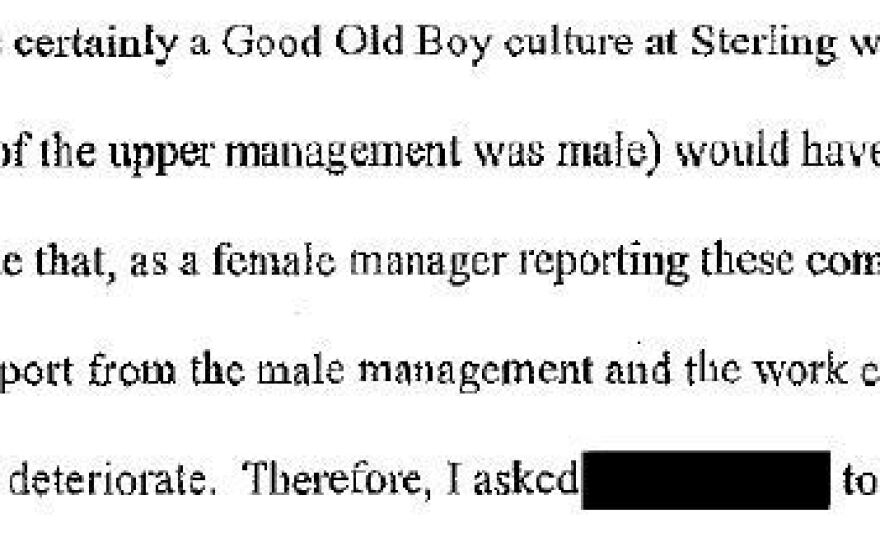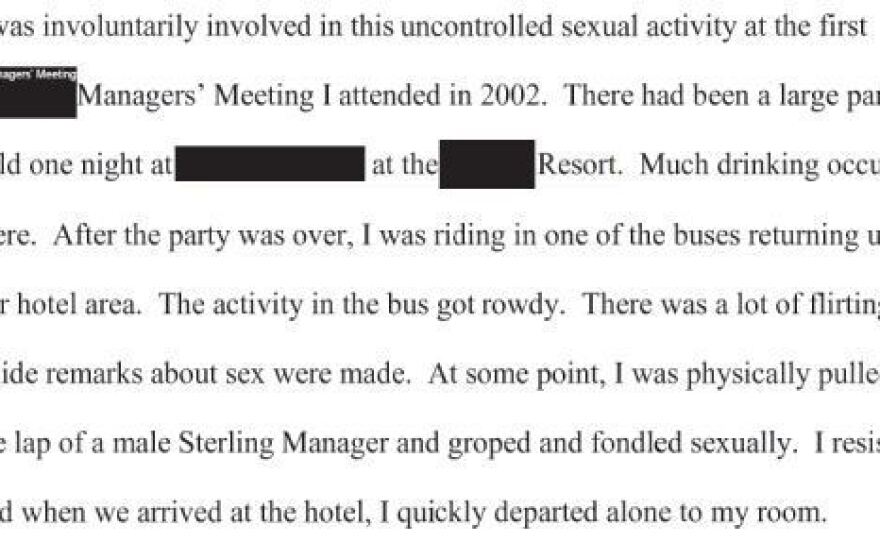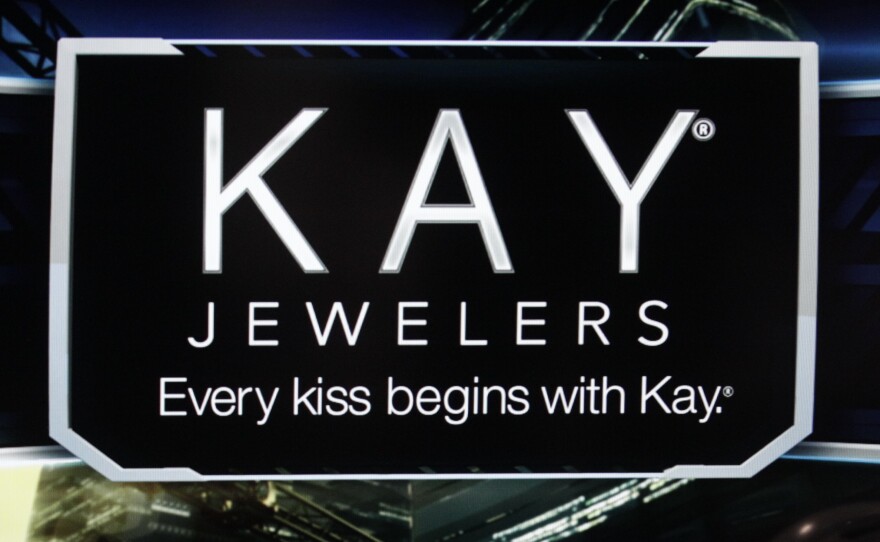Thousands of women who worked for the largest retail jewelry company in the U.S. allege that they suffered wage and promotion discrimination, and more than 200 of them describe an atmosphere in which female employees endured unwanted sexual advances from male superiors at the company.
In newly released sworn statements by current and former employees of Sterling Jewelers Inc., whose parent company runs Kay Jewelers and Jared jewelry stores among others, women describe an atmosphere of pay secrecy in which men dominated positions of power and qualified women were routinely passed over for promotions and in some cases, even publicly demeaned.
In sworn statements, female employees also described male Sterling managers and executives who grabbed their bodies, propositioned them for sex, kissed them without their consent and spoke about women's bodies and about sex during company events.
The 249 statements, most of them by women, were collected as part of a class-action lawsuit originally filed in 2008 against the company, alleging it violated the Equal Pay Act and the Civil Rights Act. The allegations of sexual improprieties have been offered to show the workplace context in which the pay discrimination allegedly occurred.
The suit covers at least 69,000 current and former employees, who it alleges were affected by wage and promotion discrimination dating to the early 1990s. About 10,000 women actively filed documentation of what they say was pay discrimination, according to an attorney handling the case.
Because the suit is being tried through arbitration, as opposed to a public trial with a judge or jury, much of the case information has been kept private until now.
On Sunday, following a request by The Washington Post, a judge ordered that more than 1,300 pages of statements be released.
The statements maintain that women who were hired as low-level employees at Kay and Jared stores were prohibited from discussing their wages but found out through informal conversations that they were making significantly less money than men doing the same work.
For example, Timeen Adair, who worked for Sterling from 1992 to 2009, said that when she found out she was being paid less than a man in the same position she complained her manager, and was eventually promoted.
"It did not seem right to me that a male who was not performing as well [as] I was should be paid more than me, and that it was justified by the possibility of some future promotion," she said in her statement.
After she was promoted to store manager, she noticed "a pattern in which female sales associates were hired at about $1 an hour less than male associates."
Adair also said she witnessed sexually aggressive behavior by executives at the company, who had power over their subordinates. She said when a certain executive visited her store, he would request that certain women "go out drinking and dancing" the night before.
"We felt obligated to go when directed like this," Adair said, because her superior told the women they needed to show up, and because the executive "typically was visiting the store the next day and no one wanted to get on his bad side."
Ellen Purdy worked for Sterling from 1987 until 2011 and said one of her superiors "would constantly call me and other female employees 'Honey.' This made me uncomfortable as it was a term of endearment reserved only for my husband. I tried to ignore it, however, as I could not afford to lose my job."
Robin Parham-Finman, who worked for Sterling from 1999 to 2007, said "there was certainly a Good Old Boy culture at Sterling where male management (most of the upper management was male) would have each others' backs."

As they rose in the company and attended managers' meetings, hundreds of women said they found themselves at alcohol-fueled gatherings at which male managers and executives, including top Sterling executives, allegedly made passes at their female subordinates.
Kristin Henry was originally hired at a store in Florida in 2000. The next year, a male colleague told her he was making $12.50 per hour. Henry made only $9.50 per hour in the same position.
Nonetheless, Henry remained with the company. She said she was passed over for management positions multiple times in favor of men who had less experience selling jewelry, before she eventually became a manager in 2005.
But in her new position, Henry was assigned to work with a man who, she said, "looked at me and and other female employees in a sexual manner that made me feel uncomfortable."
She recounted an instance in which she said the male employee told her he hoped she "was stopping by Victoria's Secret to get something to wear for him." Following the incident, she said she called the company's human resources hotline. She said the office didn't follow up with her.
Later that year, Henry attended a managers' meeting for the company. After an awards dinner, her superior, a man, "tried to kiss and touch" her. Shortly after she reported the incident, she said, she was fired from Sterling.
Diane Acampora, who worked at Sterling stores from 2002 to 2009, said, "It was common knowledge at the Company that these [manager] meetings provided abundant opportunity for heavy drinking and extramarital sexual activity between male managers, supervisors and executives and subordinate female managers."

Multiple male employees also gave sworn statements describing what they saw as systematic wage discrimination against women and sexual comments toward female employees, dating back decades.
A spokesman for Sterling, David Bouffard, wrote in an email to NPR that "It's critical to understand that none of the 69,000 class members have brought claims in this arbitration for sexual harassment or sexual impropriety," continuing:
"Indeed, the distorted and inaccurate picture of our company presented in these allegations does not represent who we are. They involve a very small number of individuals in a workforce of more than 84,000 during the class period, and many of the allegations go back decades. Complaints that were reported to the company were thoroughly investigated, and action was taken where appropriate. The company had – and continues to have – multiple processes in place to receive and investigate allegations of misconduct, and we continue to encourage all employees to use these processes to raise any workplace concerns so we can investigate and respond appropriately."
The class counsel for the case, attorney Kalpana Kotagal, says descriptions of unwanted sexual advances are relevant to the gender discrimination claim, because they point to a pervasive culture of sexual intimidation at the company.
"We contend that this evidence of sexual harassment ... is directly relevant to claims of sexual discrimination," Kotagal told NPR.
Presenting evidence that the company knew of both pay disparities and sexual harassment of female employees, and did not act sufficiently to remedy them, could suggest "a lack of real concern about discrimination," Kotagal said.
In addition to the class action being handled through arbitration, the U.S. Equal Employment Opportunity Commission filed a lawsuit, also in 2008, against Sterling, alleging wage discrimination on the basis of gender.
Copyright 2022 NPR. To see more, visit https://www.npr.org. 9(MDAzMjM2NDYzMDEyMzc1Njk5NjAxNzY3OQ001))







